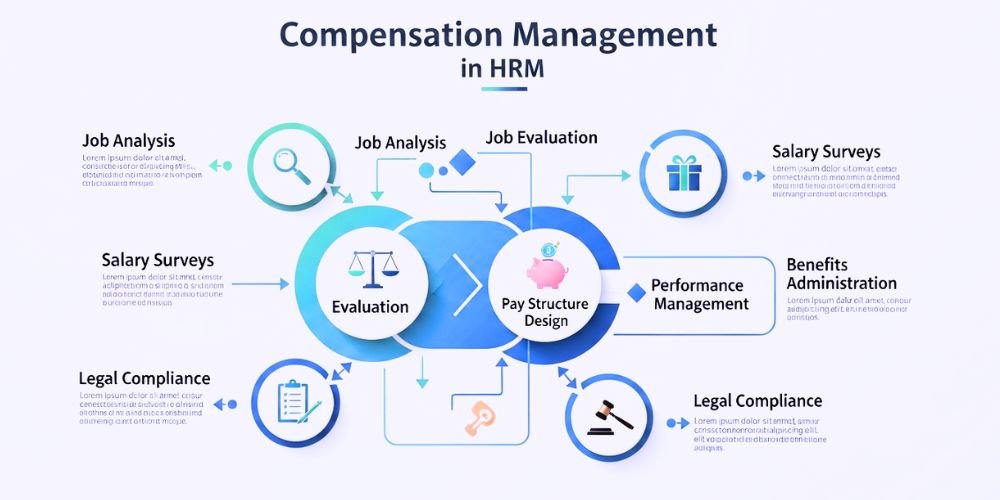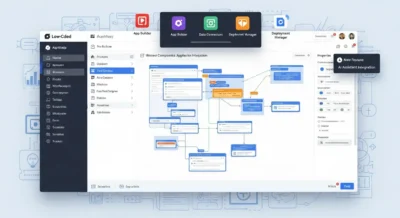Compensation management is a critical human resource management (HRM) component that focuses on designing and implementing effective reward systems to attract, retain, and motivate employees. In this article, we will explore the concept of compensation management in HRM, its key elements, significance, challenges, and its impact on employee satisfaction and organizational success.
Understanding Compensation Management in HRM
Compensation Management in HRM strategically aligns compensation practices with an organization’s goals and objectives. It aims to create a fair and competitive compensation structure that attracts and retains talented individuals, motivates high performance, and ensures internal and external equity. It encompasses the strategies, policies, and processes used to determine and administer employee compensation, including wages, salaries, bonuses, benefits, and other rewards.
Key Elements of Compensation Management in HRM
Compensation management is essential to HRM, ensuring that employees are fairly compensated for their work and that the organization remains competitive in the job market.
Job Analysis and Evaluation
The first step in compensation management is conducting a thorough job analysis to understand the roles, responsibilities, and requirements of different positions within the organization. Job evaluation techniques are then used to determine the relative worth of each job, considering factors such as skills, knowledge, experience, and responsibilities.
Compensation Strategy
A well-defined compensation strategy aligns compensation practices with the organization’s overall business strategy. It involves determining the organization’s positioning regarding compensation, deciding on the mix of fixed and variable pay, and establishing salary ranges and structures.
Market Analysis
Conducting a market analysis helps organizations benchmark their compensation practices against industry standards and competitors. It involves gathering data on compensation trends, salary surveys, and industry-specific benchmarks to ensure that the organization remains competitive in attracting and retaining top talent.
Performance Management
Compensation Management in HRM is crucial in compensation management. Linking performance with compensation helps reward high performers, incentivize desired behaviors, and motivate employees to achieve individual and organizational goals. Performance appraisal systems are used to evaluate employee performance and determine performance-based rewards.
Benefits and Perquisites
Compensation Management in HRM also includes designing and administering employee benefits and perquisites. These may include healthcare plans, retirement savings programs, paid time off, flexible work arrangements, and other non-monetary rewards that enhance the overall compensation package.
The Significance of Compensation Management in HRM
Compensation management plays an integral role in HRM by ensuring that employees are adequately rewarded for their contributions and that the organization remains attractive to top talent.
Attracting and Retaining Talent
A competitive compensation package is essential for attracting and retaining top talent in the organization. By offering competitive salaries, bonuses, and benefits, organizations can differentiate themselves and attract skilled individuals who contribute to the organization’s success.
Motivating Performance
Compensation Management in HRM is crucial in motivating employees to perform at their best. Employees who see a direct link between their performance and rewards are more likely to be inspired, engaged, and committed to achieving organizational goals.
Ensuring Fairness and Equity
A well-designed compensation system ensures fairness and equity in rewarding employees. It considers factors such as job responsibilities, performance, experience, and market value to ensure that employees are compensated appropriately and that there is internal and external equity in pay.
Employee Satisfaction and Engagement
A fair and competitive compensation system contributes to employee satisfaction and engagement. When employees feel rewarded fairly for their contributions, they are more likely to be satisfied with their work and committed to the organization.
Challenges in Compensation Management in HRM
One of the biggest challenges in compensation management in HRM is striking the right balance between attracting and retaining top talent while also managing costs effectively.
Market Volatility
The dynamic nature of the job market and changing economic conditions pose challenges in compensation management. Organizations must stay abreast of market trends and adjust their compensation practices to remain competitive.
Pay Compression
Pay compression occurs when there is a small difference in pay between employees at different levels within the organization. It can lead to morale issues and hinder career progression. Effective compensation management addresses pay compression to maintain internal equity.
Retaining High Performers
Identifying and having high performers can be challenging in Compensation Management in HRM. Organizations need to develop reward systems that recognize and retain top talent to ensure they remain motivated and engaged.
Legal and Regulatory Compliance
Compliance with labor laws, regulations, and pay equity requirements is essential in compensation management. Organizations must ensure their compensation practices align with legal requirements to avoid legal issues and reputational damage.
The Impact of Compensation Management in HRM
Effective Compensation Management in HRMt has several positive impacts on both employees and organizations:
- Employee Motivation and Productivity: Fair and competitive compensation systems motivate employees to perform at their best and increase productivity. It creates a sense of achievement and recognition for their efforts.
- Employee Satisfaction and Retention: A well-designed compensation system contributes to employee satisfaction and reduces turnover. When employees feel fairly compensated, they are more likely to stay with the organization, reducing recruitment and training costs.
- Employer Branding: Organizations that offer competitive compensation packages and reward systems build a positive employer brand. It attracts top talent, enhances the organization’s reputation, and positions it as an employer of choice.
- Organizational Performance: Effective compensation management aligns individual and corporate goals, driving overall performance. It encourages employees to achieve strategic objectives and supports the organization’s success.
Conclusion
Compensation management in HRM is a critical function that ensures fairness, motivation, and competitiveness in reward systems. By strategically designing and implementing compensation practices, organizations can attract and retain top talent, motivate high performance, and enhance employee satisfaction.
Compensation management considers factors such as job analysis, market analysis, performance management, and benefits administration to create a fair and competitive compensation structure. Despite the challenges it presents, effective compensation management has a positive impact on employee engagement, productivity, and organizational success.













